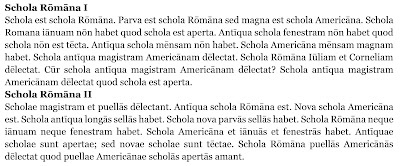[1] (After) having read the letter [2] she was very
touched.
[1] can only refer to [2] i.e. the subject of the
sentence.
Now look at a similar sentence in Latin:
[1] Litterīs acceptīs ¦ [2] imperātor valdē
īrātus est.
= [1] with the letter having been received, [2] the general
got really angry
= [1] after / when / since the letter had been received,
[2] the general got really angry
There is no grammatical connection between [1] and
[2]; there is no implication that it was the general who received it. Context,
however, may allow such a translation. In the first two examples below (both
quoted in Dickinson), the ablative absolute is obviously referring to Caesar
even though that is not directly stated:
Caesar, acceptīs litterīs, nūntium mittit (Caesar) │ Having
received the letter [literally: with the letter having been received],
Cæsar sends a messenger.
Quibus rēbus cōgnitīs Caesar apud mīlitēs cōntiōnātur
(Caesar) │ Having learned this [literally: with these thing having been
learned], Cæsar makes a speech to the soldiers.
Look, however, at the following examples:
Urbe dēlētā, cīvēs fūgērunt.
**Having destroyed the city** the citizens fled.” It is
highly unlikely that the citizens destroyed their own city! Therefore, the
original translation of the ablative absolute – with no connection to the
subject – would be the appropriate one:
- When / after / since the city had been destroyed, the
citizens fled.
- The city had been destroyed and the citizens fled.
Equō vēnditō agricola domum
rediit.
This is a good example where it is down to context:
[1] Either: After / when / since the horse had been sold,
the farmer returned home. / The horse had been sold and the farmer returned
home.
[2] Or: Having sold the horse, the farmer returned home.
In general, when translating the ablative absolute –
especially when you are still getting to grips with it – it is better to stick
with [1] because [1] is always correct whereas [2] could be a misinterpretation
of the Latin.












